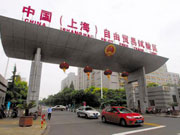Testing ground for economic reforms hits 6-month mark

 0 Comment(s)
0 Comment(s) Print
Print E-mail CNTV, March 31, 2014
E-mail CNTV, March 31, 2014
Today marks the six month anniversary of the establishment of the Shanghai Free trade zone. Over the past six months, what kind of changes has taken place there? What kind of changes will the free trade zone bring to people’s life ? We are joined in the studio by our reporter Michelle Xing to give us a brief summary.
Nearly six months after it was established in September, the free trade zone has launched pilot schemes to advance financial reforms. Key programs include easing the cross border use of the Chinese currency, liberalizing interest rates on foreign currency loans, and facilitating offshore financing and outbound investment. The financial reforms in the zone are expected to be rolled out and tested so they can be applied elsewhere in China by September this year, at the trade zone’s one year anniversary. Besides financial reforms, the free trade zone also adopted the famous "negative list" approach, which specifies bans or restrictions on certain types of foreign investment.The negative list as opposed to the positive list means that all businesses are allowed without restrictions unless it is specified on the list. It makes investment opportunities more transparent. The list currently includes 190 special regulatory measures, covering a broad range of activities. As of the 17th of this month, close to 94 percent of the 619 foreign companies registered in the free trade zone no longer need administrative approval. The percentage has exceeded expectations. Of course, if you are into facebook or twitter, you can access them in the free trade zone. China has made the landmark decision to lift a ban on internet access in the free trade zone to foreign websites that are considered politically sensitive. It would also welcome bids from foreign telecommunications companies for licences to provide internet services within the zone.--These are just a few of the many changes happened in the zone in the past six month, the goal is to test out these reforms before they can be implemented else where in China.
Q2: What other reforms and innovations can we expect in the near future?
More detailed policies will be introduced this year in order to boost interest and push forward reforms. Rules on implementation of the free trade account system will be rolled out before the end of June. This will enable full convertibility of the Chinese currency and allow offshore financing in the Free Trade Zone. The account will help Chinese companies, especially those engaged in foreign trade, secure cheaper yuan-denominated funding from offshore, where financing costs have been lower than that on the Chinese mainland. Also, the so-called negative list for the free trade zone may be cut by 40 percent this year. This will significantly increase the number of sectors open to investors in the zone. Further liberalization of service sectors, including senior care, accounting and auditing, e-commerce and film production, is among the priorities this year. A new batch of details for financial reforms will also be introduced soon, including some that are designed to facilitate convenient exchanges for investment and financing.






Go to Forum >>0 Comment(s)